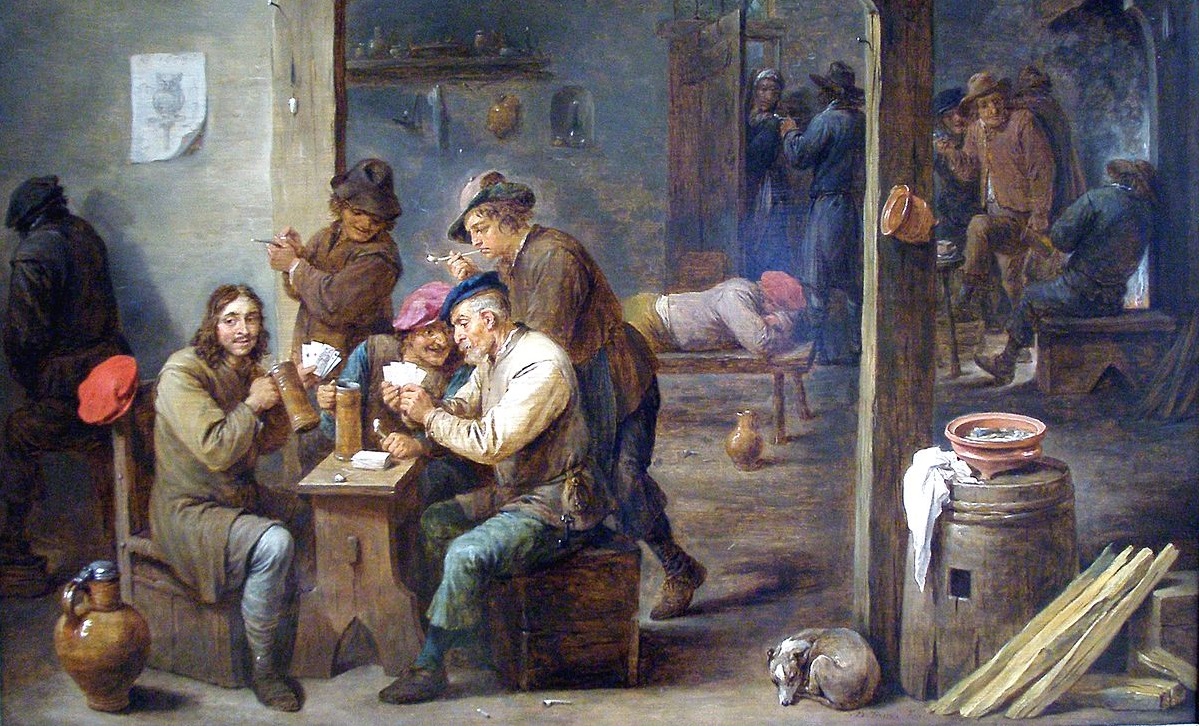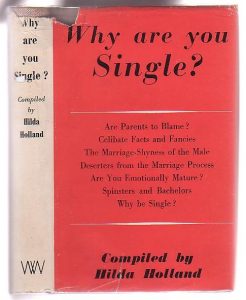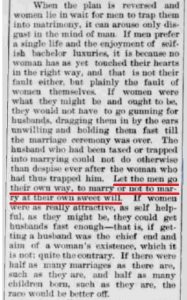*First published in May 2016.

Recently, Brad Wilcox of PragerU did a video trying to sell the idea that a man is better off yoked to a woman he has to take care of versus life as a bachelor pursuing his own interests and leisure activities.
The reaction from the group of men who identify as Men Going Their Own Way, or MGTOW, was swift, critical and on point.
Now, you might think that the divide between MGTOW and pro-marriage advocates is a relatively new one, born in the internet by a collection of men who made a choice to rebel against the institution of marriage and opened a real-time, public dialogue about it.
In modern times we can trace the kerfuffle back to the early 2000’s, when a group of Men’s Rights Activists created the first internet forum dedicated to men going their own way. An archived conversation with one of the founders was recorded by Rocking Mr. E.
Part of the problem those men encountered was also, in their minds, the solution. Men of this type were fiercely independent. Or, more bluntly put, MGTOW tend not to play well with others. Rather than cooperate with each other, they often went their own way.
That is not a criticism. Quite the contrary, it was MGTOW steadfastness and out-of-the-box thinking that led them to re-popularize the idea of men checking out and taking care of themselves.
Their ideas were subject to quick evolution. For instance, early in the first known internet version of a MGTOW manifesto, they claim to hold the objective of, and I quote, “instilling masculinity in men,” a clear “man up” mandate that would most likely be scoffed at by contemporary men going their own way.
Thus, as far as we know, is when the modern use of the term emerged. Many have assumed that this is a first for western culture, and have even struggled to claim ownership over what “going your own way” means.
There has been a fair amount of infighting over that, from which I have not been exempt. Yet, if we look at history we find that the bickering is like two fleas arguing over who owns the dog. The idea of men going their own way is bigger and older than anyone talking about it today.
Going one’s own sweet way and other variants have been in popular discourse for centuries – including but not limited to men’s freedoms and the right to a bachelor life.
There is a record of men avoiding marriage — the dictates of gynocentrism, and the attempts by those who would shame men from that path that stretches back nearly into antiquity.
One good source to gather more information on this is The Age of the Bachelor: Creating an American Subculture by Howard P. Chudacoff, a 1999 book that chronicles a good bit of the history of misogamy and debunks completely the idea that it is a new phenomenon.
The following excerpt from the volume Medieval Forms of Argument provides more detail about the tradition of men rejecting marriage:
The early manifestations of the quarrel often focus on marriage, one of the pressing problems of the late Middle Ages and the early modern period: An uxor sit ducenda (Should One Take a Wife) was a question much discussed by Italian men, and in Germany it could appear as Ob einem manne sey zu nemen ein eelichs weyb oder nit (Should a Man Take a Wife or Not? – Albrecht von Eyb, 1472). In answer to this question male misogamy (hatred of marriage) is expressed as misogyny (hatred of women) and philogyny (love of women) as philogamy (love of marriage).
Christine de Pizan’s praise of women was directed against the misogamists and misogynists of her time, the anonymous text Les quinze joies de mariage (The Fifteen Joys of Marriage) deplored the loss of male liberty in marriage, and a century later Erasmus of Rotterdam presented the misogamist virgin in his Virgo misogamos (The Misogamist Virgin – 1523), who desperately wants to enter a convent but inspired by love she thinks better of it at the last moment. Philogynous texts questioned why women were punished more strictly for adultery than men or why a husband had to be brought (by a dowry); misogamists and misogynists, eg. In England, answered the question by stating that women tend to squeeze money out of their husbands.
In Germany this aspect of the querelle has been largely ignored (interest has focused on voices which argued in favor of women’s intelligence and reason), although the querelle du mariage played an important role here: the wide-ranging marriage debate during the Reformation, in particular in its sensational and scandalous early phases – public betrothals of monks and nuns, closures of monasteries and convents, an epidemic of marriages in Germany to which even French reformers travelled who wished to marry – must be read as an integral part of the European querelle des sexes and the same goes for the marriage debates of the Counter-Reformation. Martin Luther’s Von chelichen Leben (The Estate of Married Life – 1522) speaks quite in the manner of a querelle text by turning against the traditional misogamist attitude:
“What we would speak most of is the fact that the estate of marriage has universally fallen into such awful disrepute. There are many pagan books which treat of nothing but the depravity of womankind and the unhappiness of the estate of marriage […]. So they [young men listening to the advice of a Roman official] concluded that woman is a necessary evil, and that no household can be without such an evil. […] For this reason young men should be on their guard when they read pagan books and hear the common complaints about marriage, lest they inhale poison . For the estate of marriage does not sell well with the devil, because it is God’s good will and work. This is why the devil has contrived to have so much shouted and written in the world against the institution of marriage […]. The world says of marriage, ‘Brief is the joy, lasting the bitterness.”

Looking back as recently as 1950 we have evidence of the shaming backlash against men who reject marriage and gynocentrism in the form of a book, “Why Are You Single?” a collection of essays compiled by Hilda Holland.
The thrust of the text throws a shadow on the mental and emotional fitness of confirmed bachelors, raising doubt about the quality of their parents, suggesting unresolved Oedipal issues, a lack of maturity and insufficient moral bearing. Such characteristics echo what later came to be referred to as Peter Pan Syndrome.
One of the contributors, Dr. Bernard Glueck, wrote that bachelorhood represented “primitive and infantile thinking.”
He also characterized bachelors as “impulse ridden,” “excessively narcissistic” and even “sadistic.”
It’s the mid-twentieth century version of Brad Wilcox, only with less finesse and undoubtedly less backlash from a population of men more tolerant of being shamed.
Reaching back a bit further in time, to 1896, Ernest Belfort Bax neatly summarized the obvious driving force behind the resistance. In his essay titled “The Matrimonial Privileges of Women,” Bax outlines 12 key areas that put men at unjust, egregious disadvantage, vulnerable to fraud, deception, violence and incarceration at the hands of wives.
Also, in the same year, according to Peter Wright of gynocentrism.com, “Mrs. Charlotte Smith, feminist activist and President of the Women’s Rescue League, spearheaded an anti-bachelor campaign based on her concerns about the increasing numbers of women who could not find husbands — a surprising development considering men outnumbered women in the United States then by 1.5 million. Her solution to the “problem” was to denigrate, malign, and ultimately punish bachelors in order to pressure them into marrying any women unlucky enough to remain unwed.
Part of her remedy was to have bachelors excluded from employment in prominent public sector positions. Her second punishment proposed a universal bachelor tax of $10 per year be applied, amounting to between 1-4 weeks of the average wage, with the proceeds to provide living standards for ‘unmarried maidens’ orphans and the poor.”
It seems Mr. Wilcox is standing on a lot of shoulders, and it does not stop there.
In 1707 a conversation about a bachelor tax between two young women was published. Eliza kicks off her conversation with Mariana with the following:
Amongst all the female grievances we have hitherto debated there still remains one we have not yet touch’d upon. There are an abundance of bachelors who, thro’ a cowardly apprehension of the cares and troubles of the marry’d state, are so fearful of entering into it, that they would rather run the hazard of damning their souls with the repeated sin of fornication, than they will honestly engage in Wedlock to procreate within those reasonable bounds which the united laws of both God and man have both religiously appointed: Therefore methinks it would well become the care of a Parliament to redress this grievance, so very hurtful to the Kingdom in general, as well as to our sex in particular, by some compulsory law that should enforce Marriage upon all single sinners who otherwise will never keep a cow of their own whilst a quart of milk is to be brought for a penny.”
The full conversation goes on to ensure that even celibate men are granted no reprieve. The two women imagine all sorts of evils befalling society from the minority of men who eschew married life as well as sexual relations.
In this we get a glimpse of the true source of hostility toward gay men. The hatred is not a fear of them, but a resent of their freedom and their lack of utility to women.
To Eliza and Mariana, as it is to the Bradford Wilcox’s of today, men must marry, and they must do so within the confines of the law and the church. If they refuse, they are inferior, defective threats to society. They are to be punished and burdened for their refusal to indulge gynocentric culture.
Yet still, men resisted.
In 1898, two years after Charlotte Smith started advocacy to shame and punish men who refused to marry, a group was formed by the name, “Anti-Bardell Bachelor Band.” Their mandate was clear.
As was reported in the New York World, then one of New York City’s two top newspapers, ‘The motto of the club is Solomon’s proverb: “It is better to live in a corner of the housetop than with a brawling woman in a wide house.” The objects of the club are to oppose matrimony, to fight for the liberty of man, to encourage the manufacture of all such devices as bachelor buttons and to check the movement inaugurated by Mrs. Charlotte Smith “and other disgruntled females” to require bachelors to wed.’
In one declaration, it is a statement supportive of both men’s rights and men going their own way.
Eventually, of course, these voices of dissent on behalf of men would be pushed out of the mainstream media and shunned, as the media became more and more feminized. We can see the eventual result of that now plastered across the pages of most mainstream publications and places like PragerU, mocking and demonizing MGTOW and the MHRM, generally speaking.
The point of this is to make clear that misogamy, which covers the lion’s share of MGTOW, isn’t new. And MGTOW itself, has risen and fallen throughout the ages under many different names.

Even literal reference to the subject predates all of us with a feminist writing about and somewhat encouraging men to go their own way in 1897.
The difference now, and actually the only difference, is the internet. With the new technology, silencing men who reject the slavish dictates of legally sanctioned marriage is no longer possible. As an instrument of support and education, the World Wide Web now affords the opportunity to reject marriage, and to reject the inevitable shaming by feminists and gynocentrists like Brad Wilcox.
Marching to your own drum still comes with a price, but the internet has made it affordable. That isn’t good for marriage as it stands. Since white feathers and the empty allegation of being less than manly no longer work, the only solution left will be what has heretofore been unspeakable.
If society wants to encourage young men to marry, it will require an overhaul of the law and an overhaul of the female psyche. Biased laws have to go. The outrageous privilege and entitlement of women have to go.
It is hard to tell which will be harder. The legal change or the social change. Both are daunting. Most MGTOW won’t care to worry about it, though. They will be too busy living their lives. They have already gotten the message, even if most don’t know how old that message is.
Here at A Voice for Men we have already explored the roots of romantic love and chivalry that led us to life under the branches of this twisted old gynocentric tree.
We’ve taken it back 900 years to the work of Eleanor of Aquitaine and her daughter Marie de Champagne, who commissioned many a troubadour to spread propaganda glorifying male sacrifice for the sake of women.
But even then there was a chink in the armor. In their seminal commissioned work, The Art of Courtly Love, by Andreas Capellanus, he makes a surprise conclusion after penning chapters on the noble dictates of romantic chivalry.
He says, and I quote: “Therefore if you will examine carefully all the things that go to make up love, you will see clearly that there are conclusive reasons why a man is bound to avoid it with all his might and to trample under foot all its rules.”
One has to wonder if the courtly Marie ever read the whole work, and Capellanus may count himself lucky if she did not read the above addenda to the work – she might have had him beheaded.
Incidentally, the tendency to claim absolute ownership of the meaning of bachelorhood is also nothing new. Over a hundred years ago, in The Bachelor Book, a magazine dedicated to confirmed bachelors, we read the following:
Bachelorhood is surely one of the fine arts. No man becomes a bachelor other than by selection. A mere failure to connect on the matrimonial timetable does not constitute a bachelor! By no means. As well you might call a man a Frenchman who missed his steamer, thereby finding himself in France.”
Today, many MGTOW will tell you that they had it backwards, that all it takes to be MGTOW, or a “real” bachelor if you will, is to miss that steamer. Perhaps there would even be a war of words between Bachelor Book subscribers and some modern MGTOW.
If there were, though, it would hardly matter. With time, and with embracing an understanding of our shared history, a larger revolution is unavoidable.
What constitutes a real bachelor or a real MGTOW? I am not going to pretend to know. I am just thankful that the age of shame is over for any man who chooses, and that the advocates of male subservience to hypergamy and gynocentrism no longer have the pulpit to themselves.
They can kiss those days goodbye, forever. We know this as we see them on the receiving end of some of the shame they are dishing out.
Fedora tip to Peter Wright of gynocentrism.com.